|
|
|
Sort Order |
|
|
|
Items / Page
|
|
|
|
|
|
|
| Srl | Item |
| 1 |
ID:
157601


|
|
|
|
|
| Summary/Abstract |
This paper is a comparative case study that examines the different ways that the European Union (EU) and the Association of Southeast Asian Nations (ASEAN) implement cultural projects. It contends that one key difference between the two is that the former emphasizes regional commonality in its activities, while the latter highlights the differences among countries. Applying a historical institutionalist perspective, this paper argues that the disparity between ASEAN and EU cultural projects can be explained by historical differences, which are manifested in ideas that were institutionalized when the two organizations were created. For example, since its establishment after the Second World War, the European bloc has been guided by the vision of creating an ever-closer union, which aligned policy preferences towards deepening integration among Member States. On the other hand, the Southeast Asian bloc has consistently maintained the primacy of state sovereignty and, as such, has favored cultural policies that allowed countries to showcase their respective national cultures.
|
|
|
|
|
|
|
|
|
|
|
|
|
|
|
|
| 2 |
ID:
157603
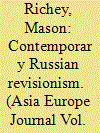

|
|
|
|
|
| Summary/Abstract |
In this policy brief, after an account of the historical-political context of Russia’s recent aggressive actions, I examine the objectives, strategy, and tactics of Russia’s information warfare, particularly as concerns eastern Europe and Syria, although also against selected western European states and the USA. Of special interest is the notion that Russia’s disinformation is potent because it does not necessarily establish falsehoods as true, but rather pollutes political discourse such that news information consumers are led to doubt the very concepts of truth and objective political facts. I conclude by (a) discussing the impact this strategy has had—and will continue to have—on Europe’s domestic politics, as well as on the global liberal order, and then (b) broaching policy ideas for countering Russian disinformation.
|
|
|
|
|
|
|
|
|
|
|
|
|
|
|
|
| 3 |
ID:
157597
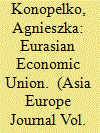

|
|
|
|
|
| Summary/Abstract |
As a top trading partner and the foreign investor in Kazakhstan, attempting to deepen bilateral relations and review its previous policy towards Kazakhstan and the post-Soviet Central Asian region (The post-Soviet Central Asian region unites five former Soviet republics: Kazakhstan, Kyrgyzstan, Tajikistan, Turkmenistan and Uzbekistan) as a whole, the European Union is facing up to a new set of internal and external conditions which affects its approach to the East. One of the crucial determinants taken into account in terms of the European Union policy towards its Kazakh partner derives from the more advanced processes of Eurasian integration created by the Russian Federation. The question is whether the EU will be able to compete or complement the consistent steps of the Russian integration project and whether the EU should move beyond a trade and investment approach and place emphasis on the other strategic areas? The main research objective concentrates on the identification and examination of the relationship between political decisions and the economic ties of Kazakhstan and its main strategic partners. Considering the current geopolitical situation in Ukraine and Central Asia, the new ‘EU-Kazakhstan Enhanced Partnership and Cooperation Agreement’ will develop more areas targeted at security and stabilization issues. However, the top-down initiatives are only the legal basis of sectorial cooperation, and the intensification of bilateral relations comes from bottom-up cooperation and people-to-people contacts.
|
|
|
|
|
|
|
|
|
|
|
|
|
|
|
|
| 4 |
ID:
157600
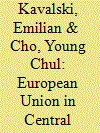

|
|
|
|
|
| Summary/Abstract |
The foreign policy statements of the European Union (EU) have long been positioning it as a global normative power. Yet, its ability to “Europeanize” international affairs has rarely been examined outside of the EU enlargement framework. In this respect, the EU’s initiatives in Asia offer a relevant context for the consideration of its global outreach. In order to examine whether the EU has been able to catalyze the global relevance of its normative power, this study undertakes a parallel assessment of its engagement with the countries of Central Asia and Afghanistan. The suggestion is that the cultural instincts of the EU’s normative power entrap its agency in Central Asia and Afghanistan and make it difficult for Brussels to develop a coherent strategy not only in the region, but also in Asia.
|
|
|
|
|
|
|
|
|
|
|
|
|
|
|
|
| 5 |
ID:
157598


|
|
|
|
|
| Summary/Abstract |
On 1 July 2011, a free trade agreement was provisionally implemented between the EU and South Korea. At the time, there were clear expectations within the EU business community in Seoul about the likely impact of the deal, including an increase in EU exports, the dismantling of tariff and existing non-tariff barriers (NTBs), the possible emergence of new NTBs, the further development of mechanisms for discussion and problem-solving mechanisms, and a shift in Koreans’ perceptions of all imported EU goods as luxury items. Interviews conducted with expatriate executives, diplomats and trade officials in Seoul in 2015 revealed the extent to which these expectations have been fulfilled and also highlighted the importance of broad economic and social trends in the strong performance of EU exports since 2011. These included the maturing of the Korean economy and the growing need for high-end industrial goods, and the Koreans’ increasing purchasing power and the concomitant desire to engage in displays of wealth. In addition to contributing to the general academic debate on the impact of free trade agreements (FTAs) and adding specific colour to the case of the EU-Korea FTA, this research will play an important role in shaping responses to the shifting economic, social and cultural trends that will impact the future outcomes of this key trade deal between the EU and Korea. It will also inform the EC’s discussions with current and future free trade agreement partners and its analysis of the various factors influencing the actual and perceived success or failure of those deals.
|
|
|
|
|
|
|
|
|
|
|
|
|
|
|
|
| 6 |
ID:
157599
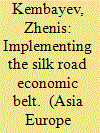

|
|
|
|
|
| Summary/Abstract |
The concept of the Silk Road Economic Belt put forward by the Chinese President Xi Jinping in September 2013 has two major dimensions: “the Road” and “the Belt”. This article examines the background, the legal status, values, institutional framework and major areas of cooperation of the Shanghai Cooperation Organisation (SCO). In doing so, it argues that building “the Road” may lead to the following: (a) the transformation of the SCO from hitherto primarily security-oriented alliance into “the Belt”, i.e. an organisation pursuing also deep economic cooperation, and (b) the establishment of a Silk Road Union based on partnership between SCO and the Eurasian alliance, constituted by two most important regional integration groupings created in the post-Soviet area, the Collective Security Treaty Organization and the Eurasian Economic Union.
|
|
|
|
|
|
|
|
|
|
|
|
|
|
|
|
| 7 |
ID:
157602
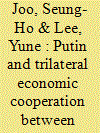

|
|
|
|
|
| Summary/Abstract |
Since 2000, President Vladimir Putin of Russia has persistently pushed for trilateral economic projects involving Moscow, Seoul, and Pyongyang, especially in the fields of energy (oil, gas, and electricity) and transportation (railroad). The Kremlin has long maintained that its proposed trilateral projects would not only be economically beneficial to all but also pave the road to inter-Korean reconciliation and peaceful unification. This article addresses three questions regarding Putin’s trilateral economic projects. What motivates Russia to push for the projects? Would they bring benefits to the three countries? Would they facilitate Korean peace process? The authors argue that Putin’s trilateral economic projects are part of Russia’s quest for power and search for a multipolar world order and should be understood from the theoretical framework of “structural realism.” The research finds that the projects are not feasible due to North Korea’s nuclear crisis and economic uncertainties and may be implemented after the current North Korea’s nuclear crisis is resolved diplomatically, if North Korea’s leadership changes or if inter-Korean reconciliation and cooperation is achieved by the progressive government of Moon Jae-In.
|
|
|
|
|
|
|
|
|
|
|
|
|
|
|
|
|
|
|
|
|